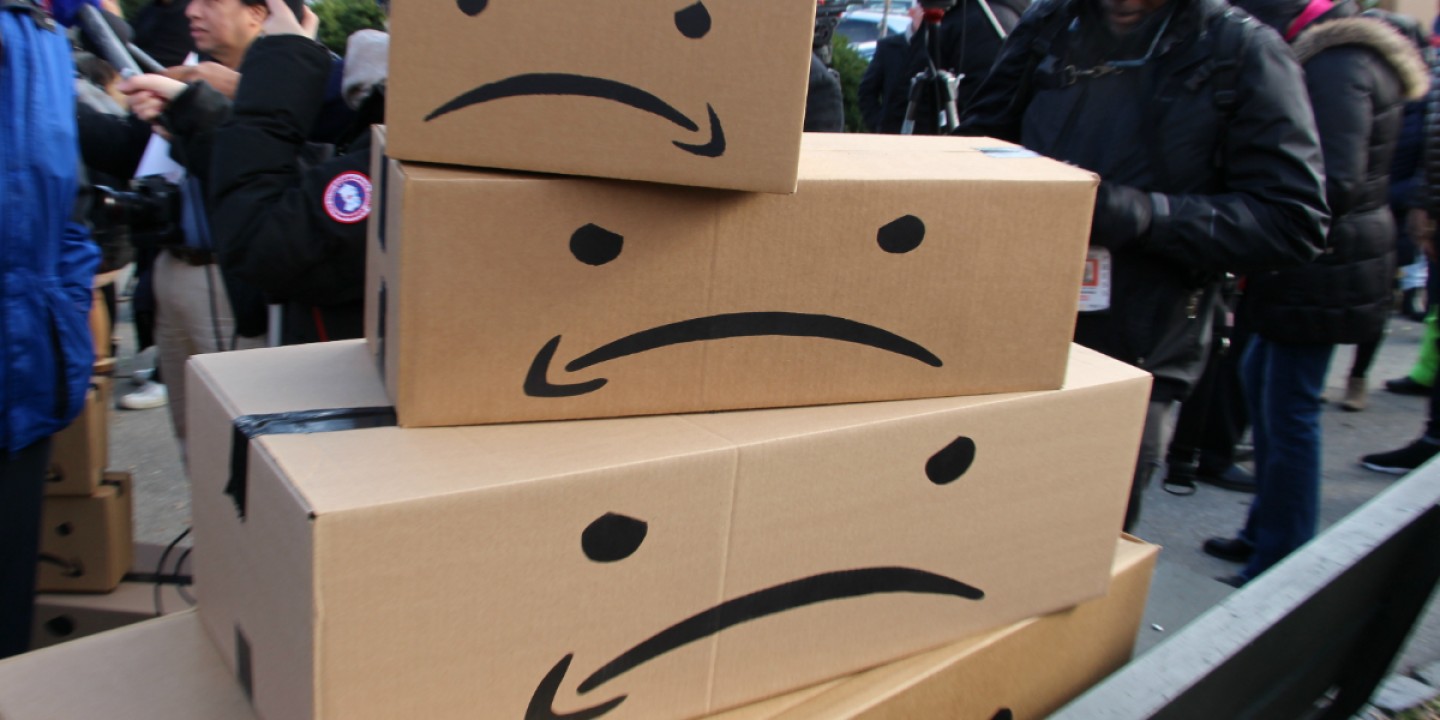Asking the right questions about Amazon HQ2
Economic development is good, except when it’s bad.

Responding to local critics, Amazon recently dropped its plan to build new “HQ2” corporate offices in New York City. After enticing numerous U.S. cities to compete publicly for the honor, the retail and tech giant had announced in November that it would build offices both in New York and in D.C. suburb Arlington, Virginia. The criticism that followed included accusations that the contest’s real purpose was to put the two cities in an advance bidding war, or to collect data from less-powerful cities that never really had a chance, or simply to build offices conveniently located near two of founder Jeff Bezos’s several homes. The whole affair smacked of Amazon’s unprecedented size, clout, and audacity.
Yet the debate in New York also followed more familiar patterns. Politicians, union leaders, and activists complained about the sweetheart deal the city offered Amazon and the lack of any clear benefit for most New Yorkers. What do 25,000 shiny new tech jobs mean to the many residents who lack the skill set to land them? Would they gain anything more useful than gentrification, with its cost-of-living increases and potential displacement?
Read our latest issue or browse back issues.
Supporters countered that what Amazon intends is to spend a bunch of its money erecting buildings and creating jobs. Why wouldn’t a city want this? The economic benefits would reverberate far beyond one new corporate campus in Queens. New high-skilled workers would spend money that would support new lower-skill jobs elsewhere. The city as a whole would be more prosperous. Even some who allowed that the deal’s terms were overly generous to Amazon, such as the New York Times editorial board, maintained that economic development is a straightforwardly good thing.
Both arguments are staples of American politics. If you present them as general theories about what it means when a company invests in a city, many Americans will find themselves immediately more sympathetic to one or the other. Yet a look at the specific issues suggests that while Amazon’s opponents had the better argument in New York, the opposite might be true elsewhere. Different cities, after all, have different problems with different solutions.
Matthew Yglesias writes at Vox about the difference between Amazon going to New York and to somewhere like Cleveland (“New York is better off without Amazon’s HQ2,” February 14). Any list of the financial stresses faced by most New Yorkers begins with housing costs—and an influx of high-income tech workers would make this problem worse. Yglesias cites economists Janna Matlack and Jacob Vigdor’s work on “tight” and “slack” housing markets. In a tight market a home is worth much more than it costs to build, and New York is a very tight market. (So is the D.C. area, where Amazon’s HQ2 plans remain on track.) In such a place, adding more rich people makes everyone’s housing even more expensive.
But Cleveland—or Detroit or Indianapolis—would be a very different story. These are slack housing markets, which Matlack and Vigdor define as places where home values and construction costs are roughly equal or there’s a surplus of existing housing. In such cities, affordable housing is not the leading problem—and, more importantly, new money in town is not likely to drive prices much higher.
Transportation infrastructure presents another contrast. Wealthy coastal cities with tight housing markets also tend to be growing in population, and their streets and public transit systems aren’t keeping up. Amazon chose a New York site near several subway lines, but it’s far from clear that those trains could handle all the new riders. Cities with slack housing markets, on the other hand, tend to have declining populations—and transportation networks built to accommodate all the people who used to live there.
In short, if you define a city’s welfare in terms not just of the business community but of the people who live there, then it’s pretty clear that more economic development is not what New York needs. But it’s exactly what Cleveland needs. It would benefit the city and its residents, across income levels.
Cleveland, of course, never made Amazon’s cut in the first place, because Amazon isn’t looking out for Cleveland. Neither are federal policymakers, who tend just to shrug when big companies move to the cities that need them the least. It’s “profoundly dysfunctional,” writes Yglesias, to see “rich cities getting richer while their low-income residents actually get poorer and the legacy infrastructure and housing stock in the Midwest steadily deteriorates.”
The HQ2 saga serves as a reminder of a central problem in American political life: while we tend to fixate on the national situation, the reality is that state and local issues usually affect people’s lives more. And these issues vary from place to place. To be sure, issues like employment, affordable housing, and corporate welfare have national and global components. Yet when it comes to the specific question of what effect HQ2 would have on a city and its residents, the answer depends largely on local variables.
These local variables point as well to the concreteness of what’s at stake in an area such as economic development. For partisans who follow national politics, the most natural way to react to something like HQ2 might be to align ourselves with whatever idea best fits our worldview—maybe “it will provide jobs” or “it will only help the rich”—and leave it at that. This sort of loyalty to principle has a plain moral sense to it, and it has a necessary place in the push-and-pull politics of a two-party system like ours. But sometimes it can lead us to focus on the wrong questions. Does a rising tide lift all boats? When big companies relocate, do they deserve a red carpet? As important as those big questions are, they may miss the trees for the forest.
A more useful question is far more concrete. How would the arrival of 25,000 new high-paying, high-skill jobs affect the lives of economically vulnerable people here, in the specific place where we’re asking the question? The answer might be less straightforward than we anticipate. It might depend on our location. And it might not confirm our existing assumptions or echo our political loyalties.
A version of this article appears in the print edition under the title “Who needs Amazon?”






